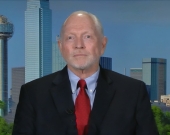Dr. Michael Mousseau: The resource curse arises wherever markets are weak
June 22, 2019
Exclusive Interviews

Dr. Michael Mousseau is a professor of International Relations Theory, Political Economy of War and Peace, Terrorism and Insurgency, department of Political Science, University of Central Florida. He is specialized in the fields of: Political Science; International Relations; Comparative Politics. And Sub-fields: International Conflict and Security; International Relations Theory; Political Economy. His Research Areas are: Conflict and security (within and among nations); Terrorism and insurgency; political development. In a written interview he answered our questions as the following:Gulan: First of all what is your overall perspective of "resource curse" in terms of its causes and consequences?
Dr. Michael Mousseau: The resource curse arises wherever markets are weak and people have to depend on groups for protection and income. Examples of groups are extended family; clans; tribes; political parties; criminal gangs; and so on.
Where markets are weak people have to fight, in groups, over access to state money and privileges. However, the relationship is non-linear:
1- If natural resource wealth is low, there is less to fight over. These states can experiment with democracy and can have stability.
2- If natural resource wealth is high (such as oil exports) there is a lot to fight over. However, if a group wins control of the state they have so much wealth to distribute that they can pay-off most groups, reducing the threat of civil war. These states are typically repressive and ideological. Saudi Arabia is an example.
3- If natural resource wealth is medium with a weak market, the odds of civil conflict are high, as too many groups remain unsatisfied with how much wealth they get.
Gulan: In your opinion how can natural resources be used for generating sustainable economic growth?
Dr. Michael Mousseau: The distribution of the natural resource wealth has to be done impartially, and directly to individuals. This way groups are less important, and most everyone feels they are being treated fairly. For instance, the state of Alaska sends a check from oil royalties to every individual adult Alaskan, annually. No group is involved. With money in circulation, real economic growth is promoted as individuals spend their money in local shops, and elected local govts can tax the people to build roads, schools, and hospitals.
Gulan: It seems like most of the resource rich countries are bedeviled by bad governance that leads to squandering the revenues generated form these resources, so can we say that the existence of these resources is a facilitating factor for the emergence of dysfunctional governance?
Dr. Michael Mousseau: Natural resource wealth, alone, does not cause dysfunctional governance. If a society has a strong market norms, meaning most individuals make their livelihoods working for, or contracting with, strangers in a marketplace, there is no resource curse. Canada and Norway have strong market norms and great natural resource wealth, but no resource curse.
Gulan: What can and should be done to turn the resources to a tool for creating effective and functional governance? What will be the well-designed and well-thought out strategy in this regard?
Dr. Michael Mousseau: The distribution of the natural resource wealth has to be done impartially, and directly to individuals, in the form of a monthly or annual check. This must be done regardless of group membership or region. This way groups are less important in the politics, and most everyone feels they are being treated fairly.
Gulan: If we look around the world, it appears that most countries that have and impressive and outstanding economic performance are not endowed with natural resources, what do you make about that?
Dr. Michael Mousseau: That is because they have strong market norms and values, which are central to economic growth. These countries have natural resources, but they are just a smaller portion of the economies because they produce so many other things. In these nations groups don’t compete over control of the state for state privileges. Instead, the people insist upon equal rule of law, because they have strong individualistic market norms and values.The way for a poor society with natural resource wealth to develop individualistic market norms and values is with the impartial distribution of resource wealth to individuals.
Gulan: some say that the root causes for spending the revenues of natural resources carelessly and recklessly, is the bad governance "governance curse" your perspective in this regard?
Dr. Michael Mousseau: The root cause is not bad governance. The root cause is weak market norms and values, which causes bad governance. Where market values are weak, a people have group collective norms and values. With strong group collective norms, it is nearly impossible to have good governance, because the people support groups, and groups insist on their share of state privileges. Anyone in government is obligated to be loyal to their group and help them, which is more important than abiding by the rule of impartial law. The only way to have good governance is to have a change in the values of a society, and the best way to make that happen with natural resource wealth is with the impartial distribution of resource wealth to individuals.















